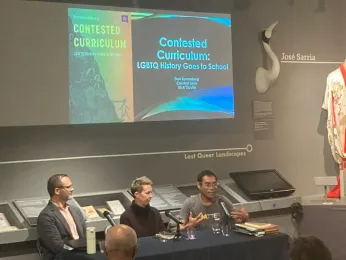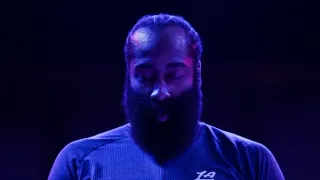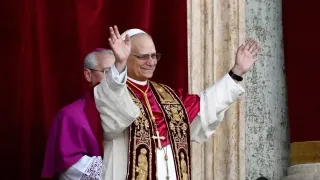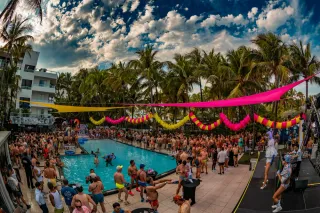
Sep 12
SF's GLBT museum panel tackles school culture wars
Dominic Laituri READ TIME: 5 MIN.
Educational lessons incorporating LGBTQ subjects have a contentious history. Even in states such as California, which have laws mandating the teaching of LGBTQ history, some school districts continue to push back.
That was the backdrop for “Contested Curriculum: LGBTQ History Goes to School,” a recent panel discussion at the GLBT Historical Society Museum in San Francisco’s Castro LGBTQ neighborhood. It featured panelists Don Romesburg, a gay man; Carolyn Laub, who is bisexual; and Rick Oculto, who identifies as queer and gay. Romesburg, formerly a professor at Sonoma State University, has written a book, also titled “Contested Curriculum: LGBTQ History Goes to School,” detailing the arduous path of the Fair, Accurate, Inclusive, and Respectful (FAIR) Education Act, California’s landmark law mandating LGBTQ-inclusive curriculum in schools.
Laub, who founded the Gay-Straight Alliance Network, now Genders & Sexualities Alliance, and Oculto, an LGBTQ+ education advocate, social worker, and community historian, contributed to the book. The discussion had 25 attendees, most of them wearing Covid masks.
“Tonight was incredible, it was amazing to encounter the history I have lived through,” said East Bay resident Molly Roquet, who identifies as a transmasc lesbian, following the September 4 event.
Laub opened up the discussion, talking about what led to the FAIR Act.
“We first had to ask, ‘What is LGBT history?’ And that was a big question,” Laub recalled, mentioning an early meeting with the Instructional Quality Commission, an advisory panel to the California State Board of Education. “They listened to us, and later gave us their idea of K-12 LGBT curriculum, which consisted of one reference to Harvey Milk, the modern court cases, and a brief paragraph on the 20th century Lavender Scare. That was it. So, we realized just how much work we had to do.”
The laborious process entailed expanding on the existing California social sciences curriculum. Beginning in second grade, students are first introduced to LGBTQ people in the unit “People who make a difference.” Other LGBTQ history lessons were attached to units in grades 4, 5, 8, 9, 10, 11, and 12. “People really thought we were teaching that Abraham Lincoln was gay. But, we were able to show that LGBT history is appropriate to each grade level and integrated with core curriculum,” Laub said. (There have been historians who have questioned Lincoln’s sexual orientation in recent years.)
After the defeat in 1978 of the statewide Briggs initiative, which sought to ban gay men and lesbians from working in California public schools, the first moves toward creating LGBTQ curriculum were sparked in the early 1980s, when GSAs first started popping up. But attempts to change California curriculum failed for the next three decades. Gay former state senator Mark Leno (D-San Francisco) authored the FAIR Education Act in 2011. It was signed into law by former governor Jerry Brown that year and went into effect in 2012, with California becoming the first state to require LGBTQ-inclusive curriculum.
“In 2011, things were happening. ‘Don’t Ask, Don’t Tell’ had been repealed, [President Barack] Obama was ‘evolving’ on gay marriage, the FAIR Education Act really landed at the right moment,” said Romesburg. “The curriculum movement was on its way, really without too much trouble until the very end of President Donald Trump’s first term, when he started attacking schools and curriculum, and it landed really well. Now it’s blown into the whole anti-DEI movement, trans sports and bathrooms, school board takeovers and recalls, Moms for Liberty, etc. It’s a frightening time.”
“History is honest, and LGBT curriculum benefits all California students because it teaches the whole story and gives a fair and accurate representation of our community,” Romesburg said.
Romesburg referenced the path of establishing a state day of special significance for the gay late San Francisco supervisor Harvey Milk. In September 2008, Republican former governor Arnold Schwarzenegger vetoed a proposal to celebrate Harvey Milk Day, saying Milk was too local to the Bay Area to be honored with a holiday. However, after the movie “Milk” came out in October 2008 to critical acclaim, and Obama posthumously awarded Milk the Presidential Medal of Freedom in 2009, Schwarzenegger reversed course and, in 2009, signed the law that established May 22nd as Harvey Milk Day.
Long road ahead
With the Trump administration’s targeted crackdown on LGBTQ rights, the road ahead looks long and rocky. One panel attendee was held rapt by the discussion, sitting on the edge of his seat and vigorously nodding along to the speakers’ statements. At the conclusion of the talk, he raced to be first in line to buy Romesburg’s book. However, when the Bay Area Reporter asked for a quote for this article, he declined, saying that he worked at a Catholic school and was afraid of retaliation if his name appeared in the paper.
Today, eight states have LGBTQ-inclusive curriculum, according to a slide the panelists presented. Twenty-three states, five territories, and Washington, D.C. have no LGBTQ-inclusive curriculum, and 19 states have at least one LGBTQ-specific school censorship law.
A woman in the audience asked, “This is supposed to be taught today. How do we know this content is appearing in Bakersfield, Chico, and Eureka?”
American schools are different from most of the world in that they are hyper-localized, with states, school districts, school boards, and teachers holding immense power over what is taught in the classroom. Although the FAIR Education Act has been active for 14 years, the success of implementation is unknown, Oculto said, though as the B.A.R. reported last year, a survey of school districts in the state found most of the responding ones had not adopted all of the LGBTQ curriculum standards required by the state law.
“No one has provided funding to audit how much of this curriculum is appearing in classrooms. We approached all the usual LGBT philanthropic donors, but no one thought school curriculum was important enough to donate money, our largest single donation was $5,000,” Oculto said. “And even the California coast can have detractors. The Los Angeles County Office of Education hired my team to do curriculum training for all school districts in L.A. County. It was going great, and then we had a middle school teacher approach us and say some teachers at their school did not agree with this content, so they went to school one day and ripped out any and all textbook pages with LGBT references.”
The panelists kept the history, education and law-heavy discussion moving nimbly for the highly-engaged audience. The Reverend Jim Mitulski, a gay man living in Oakland, said, “I loved tonight, I’m very grateful to them and their work. I work in LGBTQ religious archives, I’m curious about how history is preserved and how it is being taught, and at this current moment it’s eroding, so how vulnerable is it? Like now, Don Romesburg is a tenured professor, but Sonoma State eliminated his department. I’m a pastor and this panel was preparation for my sermon on memory, so tonight was a bullseye for me.”
Romesburg added, “I’ve done LGBT curriculum workshops in Shasta, Modesto, Stockton. To teachers that are worried about pushback, I tell them, ‘You are protected by the FAIR Education Act and the state of California.’ And, the amount of pushback is way overhyped. However, when complaints do happen, teachers of color and LGBT teachers receive the brunt of them. So, I tell straight, white women that they have an incredible position here to move the needle.”
Mitulski, who used to be senior pastor at the old Metropolitan Community Church-San Francisco when it was located in the Castro, is now pastor at Congregational Church of the Peninsula UCC in Belmont.
For information on Romesburg’s book, click here.
For more on the GLBT Historical Society Museum, go to glbthistory.org.



